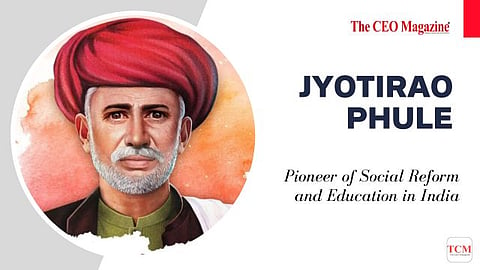Jyotirao Phule
Jyotirao Phule, an iconic figure in the history of India, was a social reformer, educator, and prolific writer who dedicated his life to the upliftment of marginalised and oppressed communities. Born on April 11, 1827, in Pune, Maharashtra, Jyotirao Phule's legacy as a champion of social justice, education, and equality is still revered and celebrated today.
Early Life and Education
Jyotirao Phule was born into a family of lower-caste farmers, a group traditionally subjected to social discrimination and oppression. Despite the challenges he faced due to his background, Phule's thirst for knowledge led him to educate himself. His marriage to Savitribai Phule, a woman with a similar passion for education, played a pivotal role in their shared journey towards social reform.
Fight Against Caste Discrimination
Jyotirao Phule's life was marked by his unwavering commitment to eradicating caste-based discrimination. He became acutely aware of the deep-seated prejudices within society and decided to challenge these oppressive norms. His famous book, "Gulamgiri" (Slavery), published in 1873, exposed the inhumane treatment of lower-caste individuals in Indian society. In "Gulamgiri," he argued for the need to abolish the caste system, emphasising the importance of equality and justice for all.
Promotion of Women's Rights
Jyotirao Phule was a staunch advocate for women's rights long before the feminist movement gained prominence in India. He recognised the double discrimination faced by women, both as lower-caste individuals and as females. To address this, he, along with his wife Savitribai, opened the first girls' school in Pune in 1848. Savitribai Phule was India's first female teacher and an instrumental figure in promoting girls' education. Their efforts laid the foundation for gender equality and women's empowerment in India.
Educational Reforms
The Phules understood the transformative power of education, and they dedicated their lives to making it accessible to the marginalised sections of society. Jyotirao Phule established the Satyashodhak Samaj (Society of Truth Seekers) in 1873. This organisation aimed to spread education among the oppressed communities and challenge prevailing orthodoxy and dogma. The Samaj's work extended to various activities, including organising schools for the lower castes, promoting critical thinking, and questioning religious superstitions.
Founding of the Satyashodhak Samaj
The Satyashodhak Samaj, founded by Phule, was an influential platform for discussing social and religious issues. The Samaj provided an opportunity for like-minded individuals to come together and work collectively to challenge caste-based prejudices and promote social reform.
Critique of Brahminical Supremacy
Phule's advocacy for the rights of the oppressed went hand in hand with his critique of Brahminical supremacy, which perpetuated caste-based discrimination. His writings and speeches exposed the injustices perpetuated by upper-caste Hindus and their control over religious and social institutions.
Legacy and Impact
Jyotirao Phule's contributions to Indian society remain indelible. His commitment to education, social reform, and the fight against caste-based discrimination laid the foundation for future social and political movements in India. The legacy of Phule's work can be seen in the social justice movements, affirmative action policies, and education reforms that have aimed to uplift marginalised communities.
Awards and Recognition
While Jyotirao Phule's contributions were not always recognised during his lifetime, he is now celebrated as a significant figure in India's history. His work has been posthumously acknowledged through various awards and honours, and his life continues to inspire those dedicated to the cause of social justice and equality.
Jyotirao Phule's life is a testament to the transformative power of education and the unwavering commitment to social justice. His pioneering efforts in the fields of education and social reform have left an indelible mark on India, and he remains a symbol of inspiration for generations committed to creating a more just and equitable society.
Follow us on Google News


